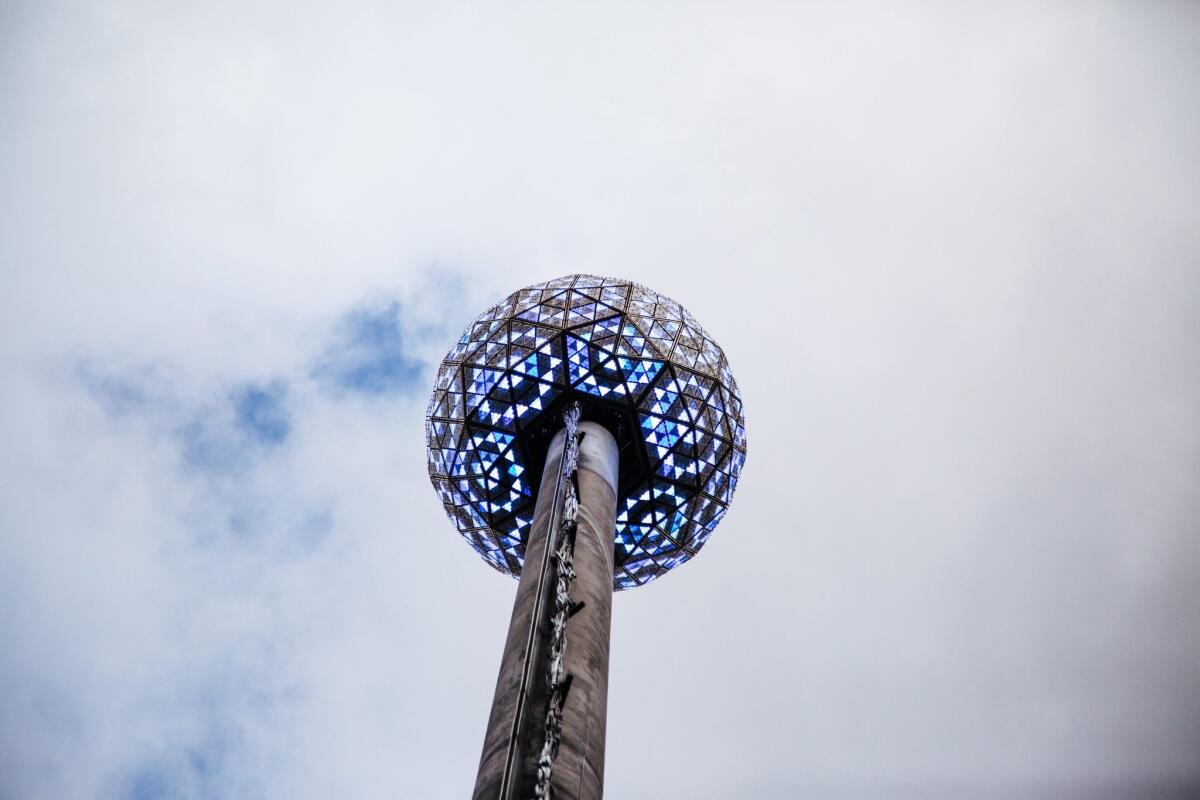Opinion: 2017 will probably be terrible. You can make it better

Good morning. I’m Paul Thornton, The Times’ letters editor, and it is Saturday, Dec. 31, 2016. No doubt some dismayed readers have been waiting for this day since, oh, early November. With that in mind, let’s take a look back at the final week in Opinion for 2016.
If you think murderous civil wars, rising global xenophobia and a conspicuously high number of deaths among beloved artists and entertainers are all good things, then you surely delight in the prospect of the good times continuing to roll in 2017.
But for those of us unnerved by the election of an unprepared authoritarian as president, the refugee crisis in the Mideast and Europe and democracies becoming a little less democratic throughout the world, there’s no comfort knowing that the clock striking midnight on Sunday will do nothing to arrest the momentum of our annus horribilis. Writing on The Times’ op-ed page, Opinion contributor Ann Friedman talks some sense into the optimists holding out for a better 2017:
The things that made the year so difficult — war, economic inequality, broken democracies, entrenched racism and sexism — are not going away. Important artists and cultural figures are going to die in 2017. Openly racist politicians with autocratic tendencies will be elected in 2017. Economies will collapse in 2017. Unarmed black people will be killed by police in 2017. Civilians will die in senseless wars in 2017, and many others will become refugees.
This is only cause for despair if we’re willing to sit idly by. Most of us have the ability to work against the forces that made this year so terrible (with the exception of human mortality, of course). We can support electoral reform efforts and opposition candidates. We can turn up in the streets to demand that our leaders protect Medicare and respect civil rights and hold police accountable. We can support organizations working to counteract the negative effects of civil wars and forced migration.
Action will require a shift in perspective. As consumers of news and social media, it’s easy to feel we are passively watching an endless number of heart-rending and blood-boiling stories unfold. The “worst year ever” frame encourages the view that we are powerless to change the headlines we read. But if we can start thinking of ourselves as agents rather than mere observers — as people who have an important role to play in changing the circumstances that currently bring us despair — the parade of negative news becomes a call to action. These compounding events are, in fact, a to-do list for the coming months.
“The past is never dead,” as the oft-misquoted William Faulkner line goes. “It isn’t even past.” This is acutely true in the waning days of 2016. While it might be an exhausting truth to recall on New Year’s Eve, when we’d rather sip bubbly wine and toast to a fresh start, next year won’t be an improvement simply because it’s a new calendar year. If we want 2017 to be better, we have to work to make it so.
She didn’t think she’d live to see 2017. Melinda Welsh put up her holiday decorations last year for what she thought was the final time, having recently been diagnosed with a form of cancer that likely was to be fatal within a year. But cutting-edge immunotherapy has given her time she thought she’d never have: “When my husband and I celebrate New Year’s Day 2017, I know there will be a depth of joy present no matter what happened before or happens after. We’ll recognize the experience for what it is — a gift of bonus time, an argument for being happy now.” L.A. Times
California’s a great place to spend 2017. Starting Jan. 1, our state will raise the minimum wage, establish equal pay for equal work, keep a more watchful eye on Uber and Lyft drivers, make it easier for sexual assault victims to report crimes, enforce stricter gun control and enact a host of other laws that will make California more Eden-like for liberals. “Does it sound like I have a crush? I think I have a crush,” writes Kara Brown. Jezebel
Pantsuit Nation squandered a golden opportunity. The 4-million member “secret” Facebook group for eager Hillary Clinton supporters could be a powerful force for opposing Donald Trump. But with the group founder’s announcement that she would compile some of the stories shared among group members into a “snuggle-in-bed-able” book, Pantsuit Nation has shown it never was a true movement but an “online kaffeeklatsch,” writes Karin Klein. L.A. Times
Ivanka Trump won’t save us. She’s everything her president-elect father is not: smooth, articulate, composed and respectful of women and scientists who say Earth is warming at an alarming rate. Don’t be fooled, writes James Kirchick: “This is a trap. Ivanka is nothing more than pretty window dressing to the explicitly authoritarian, racially divisive, conflict-of-interest-laden presidential campaign (soon-to-be administration) of her father.” L.A. Times
L.A.’s proposed ban on solo adults in park playgrounds is over the top. Councilman Mitch O’Farrell wants to cut down on “creepy activity” around children at L.A. parks, but the way he proposes to do it — by prohibiting adults unaccompanied by kids from entering playgrounds — is all wrong, writes The Times editorial board: “Why should the city assume that every adult without a child is a pedophile? That makes a childless adult a criminal just for being in a particular public space.” L.A. Times
Reach me: paul.thornton@latimes.com
A cure for the common opinion
Get thought-provoking perspectives with our weekly newsletter.
You may occasionally receive promotional content from the Los Angeles Times.








